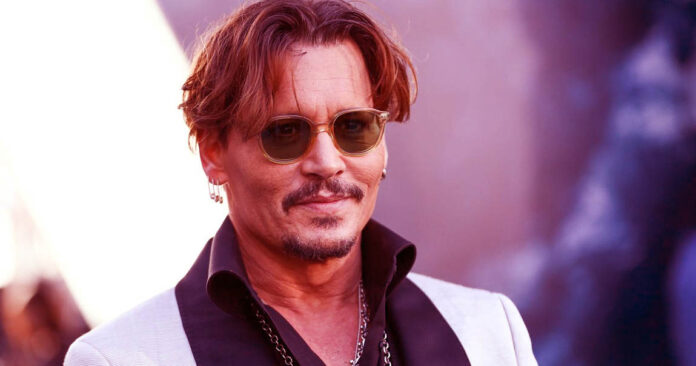In the dimly lit streets of Owensboro, Kentucky, on June 9, 1963, a star was born – a star that would later illuminate the world of cinema in ways no one could have predicted. John Christopher Depp II, or as the world fondly knows him, Johnny Depp, emerged as an enigmatic force, shaping the entertainment industry with his mesmerizing performances and idiosyncratic personality.
Johnny’s early life was far from the glitz and glamour of Hollywood. Born to Betty Sue Palmer, a waitress, and John Christopher Depp, a civil engineer, the family struggled to make ends meet. Little did they know that their son would grow up to become one of the most iconic and highest-paid actors of his generation.
In his formative years, Johnny’s family moved frequently, and he struggled to find his footing. The young Depp found solace in music, a passion that would become an integral part of his life. At the age of 12, he received a guitar as a gift from his mother. This seemingly simple gesture sparked a flame that would lead Johnny down a path of artistic expression.
Read Also : Meryl Streep: A Journey Through Time and Talent
As a teenager, Johnny dropped out of high school to pursue his musical dreams. He joined a series of garage bands, playing in bars and clubs around Florida. His musical journey took an unexpected turn when he crossed paths with Nicolas Cage, a burgeoning actor at the time. Cage recognized something special in the young Depp and encouraged him to explore acting.

Depp’s entry into the acting world was unorthodox, to say the least. His first major role was in the horror classic, “A Nightmare on Elm Street” (1984). Though the film was a commercial success, Johnny’s performance went largely unnoticed. It was his subsequent role in the TV series “21 Jump Street” (1987-1990) that catapulted him to stardom. As Officer Tom Hanson, Depp became a teen idol and household name.
However, Depp, with his rebellious spirit, soon grew weary of the heartthrob image. He yearned for roles that would allow him to showcase his versatility and depth as an actor. This desire led him to collaborate with acclaimed director Tim Burton in the offbeat fantasy film “Edward Scissorhands” (1990). The role of Edward, a man with scissors for hands, showcased Depp’s ability to portray complex characters with a perfect blend of vulnerability and strength.
The Burton-Depp collaboration became one of the most iconic in cinema history. Their artistic synergy gave birth to a string of unconventional and visually stunning films, including “Ed Wood” (1994), “Sleepy Hollow” (1999), and “Sweeney Todd: The Demon Barber of Fleet Street” (2007). Depp’s willingness to embrace eccentric roles and Burton’s unique storytelling created a cinematic alchemy that resonated with audiences worldwide.
Beyond his collaborations with Burton, Johnny Depp carved a niche for himself as a versatile actor, unafraid to take risks. His portrayal of Captain Jack Sparrow in the “Pirates of the Caribbean” franchise (2003-2017) is perhaps his most iconic role. Depp’s irreverent and unpredictable performance earned him widespread acclaim, a Golden Globe, and an Academy Award nomination.
While Johnny Depp’s career reached unparalleled heights, his personal life became increasingly complex. His romantic entanglements, including high-profile relationships with Winona Ryder, Kate Moss, and Vanessa Paradis, often made headlines. Despite the media frenzy surrounding his personal life, Depp remained fiercely private, revealing glimpses of his true self only through his choice of film roles and occasional interviews.
The actor’s commitment to his craft was evident in his transformative performances. Whether he was embodying the mad-hatter in “Alice in Wonderland” (2010) or the notorious gangster Whitey Bulger in “Black Mass” (2015), Depp demonstrated an uncanny ability to disappear into his characters. His dedication to authenticity extended to his physical transformations, such as the elaborate makeup and costumes for “Pirates of the Caribbean” or the gaunt appearance for “Sweeney Todd.”
Despite his success, Johnny Depp faced professional challenges and personal tribulations. The actor’s financial troubles became public, leading to legal battles and accusations of mismanagement against his former business managers. The legal disputes unearthed the financial intricacies of Depp’s life, revealing the extravagant lifestyle that came with his fame.
In 2016, Johnny Depp’s personal life took a tumultuous turn when he divorced his long-time partner Vanessa Paradis and entered into a highly publicized legal battle with Amber Heard, his subsequent wife. The legal proceedings laid bare the intricacies of their tumultuous relationship, with both parties making allegations of abuse against each other. The legal battle became a tabloid spectacle, tarnishing Depp’s public image and leading to a libel case against a British newspaper.

The courtroom drama exposed a vulnerable side of Johnny Depp that the public had rarely seen. Despite the setbacks, he continued to find refuge in his art. His portrayal of Gellert Grindelwald in the “Fantastic Beasts” series (2018-present) showcased his resilience as an actor, as he delved into the complexities of a morally ambiguous character.
As the legal battles raged on, Johnny Depp faced professional repercussions. He was asked to resign from his role as Grindelwald, marking the end of his involvement in the lucrative “Harry Potter” spin-off franchise. The fallout from the legal battles cast a shadow over his career, leading to speculation about the future of one of Hollywood’s most enigmatic talents.
Amid the challenges, Johnny Depp’s influence on popular culture remained indelible. He continued to be a muse for directors and a symbol of rebellion for fans who admired his unapologetic individuality. Depp’s impact extended beyond the screen; he became a fashion icon, known for his eclectic style that blended bohemian chic with rock ‘n’ roll edge.
In 2020, as the world grappled with the COVID-19 pandemic, Johnny Depp faced a pivotal moment in his career. The high-stakes libel trial against a British newspaper brought the actor face-to-face with the consequences of his tumultuous personal life. The court ruled against Depp, and the verdict dealt a blow to his reputation.
Despite the setbacks, Johnny Depp’s artistic journey continued. He embarked on new projects, including collaborations with director Andrew Levitas in “Minamata” (2020), where he portrayed a war photographer. The film highlighted Depp’s commitment to social issues and showcased his ability to bring depth to characters grappling with real-world challenges.
Read Also : Leonardo DiCaprio: A Cinematic Odyssey
As the dust settled on the legal battles, Johnny Depp found himself at a crossroads. The actor, who had spent decades navigating the unpredictable currents of fame, faced the challenge of rebuilding his career and personal life. His experiences, both triumphs and tribulations, had left an indelible mark on the entertainment industry, making him a symbol of resilience for many.
In the annals of Hollywood history, Johnny Depp’s biography stands as a testament to the complexities of fame. His journey from a small town in Kentucky to the pinnacle of cinematic success is a narrative of triumphs, trials, and the enduring power of artistic expression. As Johnny Depp continues to navigate the ever-evolving landscape of fame, one thing remains certain – his story is far from over. Whether he graces the silver screen once more or explores new avenues of creativity, the world eagerly awaits the next chapter in the fascinating tale of Johnny Depp.


